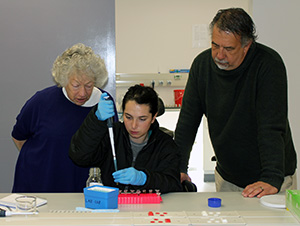Latest News Archive
Please select Category, Year, and then Month to display items
01 October 2019
|
Story Xolisa Mnukwa
|
Photo Xolisa Mnukwa
 From the left; Gift Taku, 2019 Doty winner; Reabetswe Mabine, Doty Coordinator Tshepo Zweni, first runner-up and Jacobeth Selinga, second runner-up
From the left; Gift Taku, 2019 Doty winner; Reabetswe Mabine, Doty Coordinator Tshepo Zweni, first runner-up and Jacobeth Selinga, second runner-up
The votes have been tallied, and after much deliberation, the UFS is proud to announce Gift Taku as the winner of the 2019 KovsieGear Designer of the Year (DOTY) Competition!
Tshepo Zwane and Jacobeth Selinga won second and third place respectively, with innovative designs that complied with the assessment requirements, based on originality of the design, adherence to the brand guidelines, creativity, and other criteria.
Gift’s design triumphed with 845 votes on the UFS KovsieLife webpage, as well as in the presentation in front of a judging panel.
Since 2016, KovsieGear has been discovering local (UFS staff and students) graphic designers and giving them a platform to showcase their work through DOTY, which runs annually. The aim of the competition is to support local talent by giving entrants an opportunity to come up with creative designs that are unique to the university and which will be used on limited-edition apparel in the store, as well as getting featured in the KovsieGear catalogue.
The competition has since fashioned the best clothing-logo designs the university has ever seen and continues to motivate and empower students to make positive contributions to the Kovsie campus culture and brand.
For more information about DOTY contact Reabetswe Mabine at MabineR@ufs.ac.za
The winning design by Gift Taku:

Monkey research attracts international attention
2016-07-11

Prof Trudy Turner from the University of
Wisconsin-Milwaukee and Prof Paul Grobler
from the Department of Genetics at the
University of the Free State, together with one
of the students researching monkey genes.
Photo: Siobhan Canavan
For this year’s Summer School programme, Prof Paul Grobler, from the University of the Free State Department of Genetics focuses on research about the conflict between monkeys and humans in areas where monkeys are regarded as problem animals.
Global expert part of research
This year, Prof Grobler is hosting a group of students and lecturers from the United States of America (USA). The group includes Prof Trudy Turner from the University of Wisconsin-Milwaukee (UWM), a global expert on vervet monkeys. She has been working with the Department of Genetics at the UFS for the past fifteen years, and has also been appointed as an Affiliated Professor in the department.
“The Summer School programme is an opportunity for the American Primatology students to gain practical experience in Africa,” says Prof Grobler.
International interest in Summer School
This year’s Summer School programme involves four lecturers and nine students. The lecturers are from the University of Wisconsin-Milwaukee (UWM), the University of California, Los Angeles (UCLA), Boston University, and Central Washington University.
“We use the genetic information to determine
how monkeys historically infiltrated the
different areas in South Africa.”
This year’s focus is on the genetic structure of the monkeys in South Africa, and research that is being done on the differences and similarities in monkeys from different areas. “We use the genetic information to determine how monkeys historically infiltrated the different areas in South Africa,” says Prof Grobler.
Local nature reserve acting as host
The group will perform field work, including observing monkeys in the Soetdoring Nature Reserve, as well as laboratory work in the department, where they will be assisted by two laboratory technicians.
Two years ago, Prof Grobler and his department tested this idea on a smaller scale, and now they hope to make this a regular event.